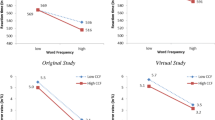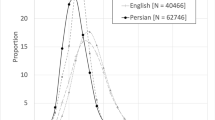Abstract
In this paper, we investigate whether the word frequency effect and the word similarity effect could be applied to Korean lexical decision task (henceforth, LDT). Also we propose a computational model of Korean LDT and present comparison results between human and computational model on Korean LDT. We found that the word frequency effect and the similarity effect in Korean LDT were language general phenomena in both the behavioral experiment and the proposed computational simulation.
This study has been supported by the Korea Research Foundation(2004-074-HM0004).
Preview
Unable to display preview. Download preview PDF.
Similar content being viewed by others
References
Andrews, S.: Frequency and Neighborhood Effects on Lexical Access: Lexical Similarity or Orthographic Redundancy? Journal of Experimental Psychology: Learning, Memory, and Cognition 18, 234–254 (1992)
Becker, C.A.: Semantic context and word frequency effects in visual word recognition. Journal of Experimental Psychology: Human Preception and Performance 5, 252–259 (1979)
Chambers, S.M.: Letter and order information in lexical access. Journal of Verbal Learning and Verbal Behavior 18, 225–241 (1979)
Forster, K.I.: Accessing the mental lexicon. In: Walker, E.C.J., Wales, R.J. (eds.) New approaches to language mechni, North-Holland, Amsterdam (1976)
Grainger, J., Muneaux, M., Farioli, F., Ziegler, J.C.: Effects of phonological and orthographic neighborhood density interaction in visual word recognition. The Quarterly Journal of Experimental Psychology 58A(6), 779–793 (2005)
Hinton, G.E., Shallice, T.: Lesioning an attractor network: Investigatins of acquired dyslexia. Psychological Review 98(1), 74–95 (1991)
Lim, H.S., Nam, K., Hwang, Y.: A Computational Model of Korean Mental Lexicon. In: Gervasi, O., Gavrilova, M.L., Kumar, V., Laganá, A., Lee, H.P., Mun, Y., Taniar, D., Tan, C.J.K. (eds.) ICCSA 2005. LNCS, vol. 3480, pp. 1129–1134. Springer, Heidelberg (2005)
McClelland, J.L., Rumelhart, D.E.: An interactive activation model of context effects in letter perception: Part 1. An account of basic findings. Psychological Review 88, 375–407 (1981)
Morton, J.: Interaction of information in word recognition. Psychological Review 76, 165–178 (1969)
O’Connor, R.E., Forster, K.I.: Criterion bias and search sequence bias in word recognition. Memory and Cognition 9, 78–92 (1981)
Plaut, D.C., Shallice, T.: Deep dyslexia: A case study of connectionist neuropsychology. Cognitive Neuropsychology 10(5), 377–500 (1993)
Taft, M.: Reading and The Mental Lexicon. Lawrence Erlbaum Associates, Hove (1993)
Author information
Authors and Affiliations
Editor information
Editors and Affiliations
Rights and permissions
Copyright information
© 2006 Springer-Verlag Berlin Heidelberg
About this paper
Cite this paper
Kwon, Y., Park, K., Lim, H., Nam, K., Jung, S. (2006). Word Frequency Effect and Word Similarity Effect in Korean Lexical Decision Task and Their Computational Model. In: King, I., Wang, J., Chan, LW., Wang, D. (eds) Neural Information Processing. ICONIP 2006. Lecture Notes in Computer Science, vol 4234. Springer, Berlin, Heidelberg. https://doi.org/10.1007/11893295_38
Download citation
DOI: https://doi.org/10.1007/11893295_38
Publisher Name: Springer, Berlin, Heidelberg
Print ISBN: 978-3-540-46484-6
Online ISBN: 978-3-540-46485-3
eBook Packages: Computer ScienceComputer Science (R0)




